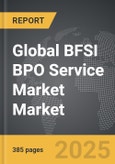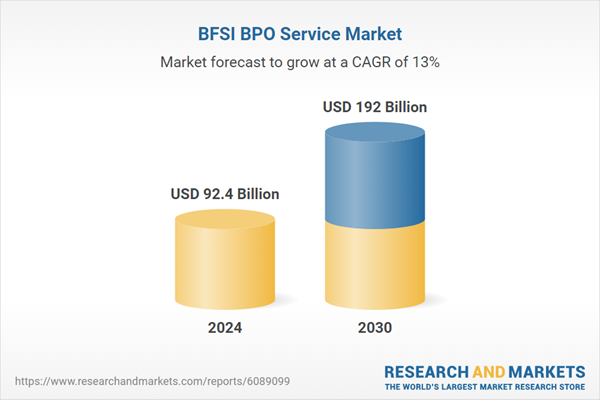Global BFSI BPO Service Market - Key Trends & Drivers Summarized
Why Are BFSI Organizations Increasingly Outsourcing Processes to BPO Providers to Drive Efficiency, Agility, and Digital Transformation?
Banking, Financial Services, and Insurance (BFSI) institutions are increasingly leveraging business process outsourcing (BPO) to streamline operations, reduce costs, and accelerate digital transformation amid rising regulatory complexity, cost pressures, and shifting consumer expectations. BPO providers offer domain-specific expertise and scalable infrastructure that enable banks, insurers, and capital markets players to optimize transaction processing, loan origination, claims management, fraud detection, and customer servicing workflows.As financial institutions recalibrate core operations to focus on strategic functions such as digital product development and risk oversight, non-core, labor-intensive processes are being systematically transitioned to specialized BPO partners. This approach enhances operational agility while ensuring service continuity across time zones and business lines. The integration of automation, analytics, and AI within BPO delivery models further amplifies value - driving faster processing times, enhanced accuracy, and proactive compliance monitoring across high-volume, error-sensitive environments.
The pandemic-era pivot toward remote customer engagement and paperless transactions accelerated BFSI sector reliance on digital-first BPO delivery models. Providers are now embedding advanced digital capabilities - including cloud-based workflow platforms, intelligent document processing, and robotic process automation (RPA) - into traditional outsourcing engagements. This transformation is enabling BFSI clients to meet rising demands for real-time service, omnichannel engagement, and data-driven decision-making, while freeing internal resources for innovation and competitive differentiation.
How Are Technology Integration, Outcome-Based Models, and Regulatory Alignment Driving Evolution in BFSI BPO Offerings?
BFSI BPO services are rapidly evolving from transactional processing hubs to intelligent operations centers, underpinned by the convergence of digital infrastructure, AI/ML analytics, and regulatory-grade data governance. Providers are investing in cognitive automation, conversational AI, and real-time analytics to offer predictive servicing, fraud mitigation, and contextual customer insights. These capabilities are enabling BFSI clients to elevate service levels while reducing cycle times and operational risk.Outcome-based delivery models are gaining traction, where BPO contracts are increasingly tied to KPIs such as turnaround times, customer satisfaction scores, first-call resolution, and cost-per-transaction metrics. This shift is aligning incentives between clients and service providers while reinforcing accountability and performance transparency. Strategic partnerships are also expanding into co-innovation engagements, where BPO providers co-develop customer journey enhancements or AI-powered underwriting tools as part of broader digital transformation mandates.
Stringent regulatory oversight in areas such as AML/KYC compliance, data privacy (e.g., GDPR, CCPA), and operational resilience is placing new demands on BFSI BPO partnerships. Leading service providers are proactively integrating risk controls, auditability, and compliance frameworks into their delivery architecture. Secure cloud environments, end-to-end encryption, data residency compliance, and regulatory reporting capabilities are now core requirements - particularly for cross-border outsourcing models and tier-1 financial institutions.
Which Functional Areas, Regional Markets, and Buyer Archetypes Are Driving BFSI BPO Demand Growth?
Customer experience management (CXM), claims processing, mortgage servicing, collections, policy administration, and back-office operations remain high-demand BPO segments in the BFSI vertical. Within banking, loan processing, credit card operations, and anti-fraud monitoring are driving transactional outsourcing volumes, while insurance players are outsourcing underwriting support, document indexing, and claims adjudication. Capital markets firms are increasingly outsourcing reference data management, reconciliation, and compliance reporting.North America and Western Europe continue to represent the largest BFSI BPO markets due to legacy outsourcing maturity, high regulatory intensity, and cost arbitrage opportunities. Asia-Pacific, led by India and the Philippines, remains the dominant offshore delivery hub, supported by skilled labor, multilingual capabilities, and digital infrastructure. Meanwhile, Latin America and Eastern Europe are emerging as nearshore hubs for North American and EU-based financial institutions, offering language compatibility, time zone alignment, and lower geopolitical risk profiles.
Large-tier banks and insurers lead adoption, driven by the need to scale operations across multiple geographies and business lines. However, mid-sized and digital-first financial firms are increasingly engaging BPO services to accelerate time-to-market and build operational resilience without capital-intensive investments. As fintechs, neobanks, and insurtech players scale their customer bases, they are adopting modular BPO models that combine cloud-native platforms with outcome-focused delivery - reflecting a growing convergence between traditional outsourcing and digital enablement.
What Are the Factors Driving Growth in the BFSI BPO Service Market?
The BFSI BPO service market is expanding as financial institutions pursue operational optimization, regulatory compliance, and digital transformation through specialized outsourcing partnerships. The transition from labor arbitrage to outcome-driven, technology-enabled delivery is redefining the strategic value of BPO across banking, insurance, and capital markets ecosystems.Key growth drivers include rising demand for intelligent automation, real-time customer engagement, risk and compliance support, and scalable delivery across global operations. The evolution of hybrid cloud, AI-integrated workflows, and regulatory-as-a-service models is further reinforcing the role of BPO in supporting agile, future-ready BFSI operations.
As financial institutions seek to align operational efficiency with digital innovation and regulatory assurance, could BFSI BPO evolve into a strategic orchestrator of intelligent enterprise operations - integrating technology, compliance, and customer-centricity across an increasingly complex and dynamic financial services landscape?
Report Scope
The report analyzes the BFSI BPO Service market, presented in terms of market value (US$). The analysis covers the key segments and geographic regions outlined below:- Segments: Service Type (Transaction Processing, Customer Support, Risk Management, Compliance Management, Other Service Types); Deployment (Cloud-based, On-Premises, Hybrid); End-Use (Banks, Insurance Companies, Capital Markets, Other End-Uses).
- Geographic Regions/Countries: World; United States; Canada; Japan; China; Europe (France; Germany; Italy; United Kingdom; Spain; Russia; and Rest of Europe); Asia-Pacific (Australia; India; South Korea; and Rest of Asia-Pacific); Latin America (Argentina; Brazil; Mexico; and Rest of Latin America); Middle East (Iran; Israel; Saudi Arabia; United Arab Emirates; and Rest of Middle East); and Africa.
Key Insights:
- Market Growth: Understand the significant growth trajectory of the Transaction Processing Service segment, which is expected to reach US$58.3 Billion by 2030 with a CAGR of a 10.6%. The Customer Support Service segment is also set to grow at 15.9% CAGR over the analysis period.
- Regional Analysis: Gain insights into the U.S. market, valued at $25.2 Billion in 2024, and China, forecasted to grow at an impressive 17% CAGR to reach $39.8 Billion by 2030. Discover growth trends in other key regions, including Japan, Canada, Germany, and the Asia-Pacific.
Why You Should Buy This Report:
- Detailed Market Analysis: Access a thorough analysis of the Global BFSI BPO Service Market, covering all major geographic regions and market segments.
- Competitive Insights: Get an overview of the competitive landscape, including the market presence of major players across different geographies.
- Future Trends and Drivers: Understand the key trends and drivers shaping the future of the Global BFSI BPO Service Market.
- Actionable Insights: Benefit from actionable insights that can help you identify new revenue opportunities and make strategic business decisions.
Key Questions Answered:
- How is the Global BFSI BPO Service Market expected to evolve by 2030?
- What are the main drivers and restraints affecting the market?
- Which market segments will grow the most over the forecast period?
- How will market shares for different regions and segments change by 2030?
- Who are the leading players in the market, and what are their prospects?
Report Features:
- Comprehensive Market Data: Independent analysis of annual sales and market forecasts in US$ Million from 2024 to 2030.
- In-Depth Regional Analysis: Detailed insights into key markets, including the U.S., China, Japan, Canada, Europe, Asia-Pacific, Latin America, Middle East, and Africa.
- Company Profiles: Coverage of players such as Archer Daniels Midland Company (ADM), Bell Flavors & Fragrances, Cargill Inc., Döhler GmbH, Firmenich International SA and more.
- Complimentary Updates: Receive free report updates for one year to keep you informed of the latest market developments.
Some of the 43 companies featured in this BFSI BPO Service market report include:
- Accenture
- Capgemini
- Cognizant
- Concentrix
- Conduent
- Datamatics Global Services Ltd.
- DXC Technology
- EXL Service Holdings, Inc.
- Firstsource Solutions Limited
- Genpact
- HCL Technologies Ltd.
- Infosys BPM Limited
- International Business Machines Corp.
- Majorel Group Luxembourg S.A.
- NTT DATA Corporation
- Sitel Group
- Sutherland Global Services
- Tata Consultancy Services Ltd.
- Tech Mahindra Limited
- Wipro Limited
This edition integrates the latest global trade and economic shifts into comprehensive market analysis. Key updates include:
- Tariff and Trade Impact: Insights into global tariff negotiations across 180+ countries, with analysis of supply chain turbulence, sourcing disruptions, and geographic realignment. Special focus on 2025 as a pivotal year for trade tensions, including updated perspectives on the Trump-era tariffs.
- Adjusted Forecasts and Analytics: Revised global and regional market forecasts through 2030, incorporating tariff effects, economic uncertainty, and structural changes in globalization. Includes historical analysis from 2015 to 2023.
- Strategic Market Dynamics: Evaluation of revised market prospects, regional outlooks, and key economic indicators such as population and urbanization trends.
- Innovation & Technology Trends: Latest developments in product and process innovation, emerging technologies, and key industry drivers shaping the competitive landscape.
- Competitive Intelligence: Updated global market share estimates for 2025, competitive positioning of major players (Strong/Active/Niche/Trivial), and refined focus on leading global brands and core players.
- Expert Insight & Commentary: Strategic analysis from economists, trade experts, and domain specialists to contextualize market shifts and identify emerging opportunities.
Table of Contents
Companies Mentioned (Partial List)
A selection of companies mentioned in this report includes, but is not limited to:
- Accenture
- Capgemini
- Cognizant
- Concentrix
- Conduent
- Datamatics Global Services Ltd.
- DXC Technology
- EXL Service Holdings, Inc.
- Firstsource Solutions Limited
- Genpact
- HCL Technologies Ltd.
- Infosys BPM Limited
- International Business Machines Corp.
- Majorel Group Luxembourg S.A.
- NTT DATA Corporation
- Sitel Group
- Sutherland Global Services
- Tata Consultancy Services Ltd.
- Tech Mahindra Limited
- Wipro Limited
Table Information
| Report Attribute | Details |
|---|---|
| No. of Pages | 385 |
| Published | February 2026 |
| Forecast Period | 2024 - 2030 |
| Estimated Market Value ( USD | $ 92.4 Billion |
| Forecasted Market Value ( USD | $ 192 Billion |
| Compound Annual Growth Rate | 13.0% |
| Regions Covered | Global |









